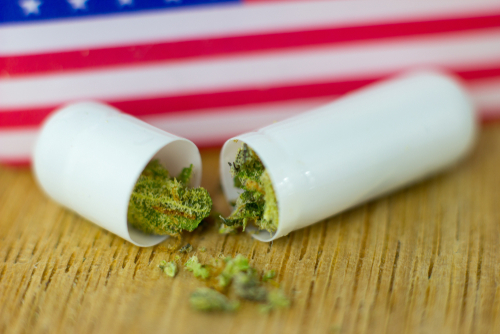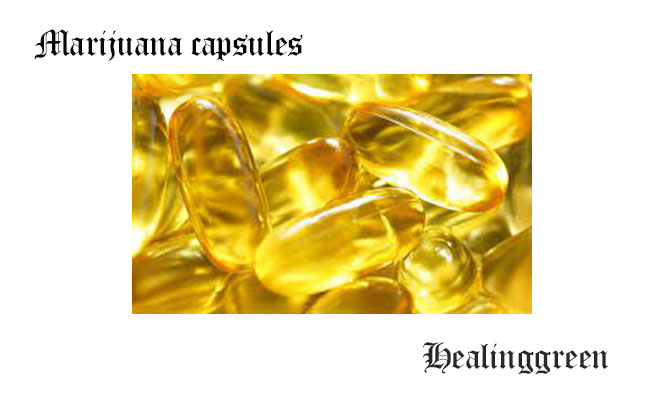THC pills are ingestible capsules that contain botanical extracts of the cannabis plant or synthetic cannabinoids. Pills containing botanical extracts are considered whole-plant cannabis products. These soft- or hard-shell pills contain liquid concentrates or ground up flower. Because the pills contain medicine extracted directly from the natural plant, they tend to contain a combination of cannabinoids rather than an isolated one.
Synthetic THC pills like nabilone and dronabinol (Marinol) are made with compounds that imitate the effects of natural cannabinoids. Although nabilone and dronabinol are designed to mimic cannabis, they are federally legal medications regulated by the FDA while cannabis remains classified as a Schedule I drug. Both nabilone and dronabinol are used to medicate chemotherapy-induced nausea. Because they lack the synergy between naturally occurring compounds in the cannabis plant, these synthetic cannabinoid therapies tend to have more severe side effects than whole-plant cannabis products.
How capsules interact with your body
Immediate-release capsules work identically to edibles. Cannabinoids enter your body through your mouth and get absorbed by your stomach. In the case of THC pills, your liver then metabolizes THC into a compound called 11-hydroxy-THC, which can last longer and have a more sedating effect than THC.

Time-release capsules follow the same route of digestion and metabolization, but the effects may be delayed or drawn out. Capsule shells engineered with liposomes and drug-polymer conjugates — like hydrogels — allow for the timed release of their contents. These protective and inert ingredients neutralize stomach acid for slower release of THC or CBD into the bloodstream.
How to take CBD and THC pills
If you’ve tried cannabis edibles, then you already have a solid understanding of the experience you can expect from THC pills. If you’re new to both of these cannabis products, know that every individual’s liver metabolizes compounds differently, which is why edibles and THC pills can produce different effects in different people. The effects of THC pills can range from sleep-inducing and pain-relieving to focused and euphoric, depending on the capsule’s ingredients. The entire experience can last anywhere from 45 minutes to several hours, depending on the individual and the potency of the THC pills.
Meanwhile, CBD pills may cause only the slightest shift in consciousness or a wave of pain relief, depending on the dose and other ingredients. Finding the right dose and cannabinoid profile for you takes some trial and error, so start with 5 milligrams (mg) of THC or less and wait at least two hours before taking more. If you’re trying CBD capsules for the first time, start with 25mg of CBD or less.
The Effects of THC Pills
THC’s psychoactive effects have been received with ambivalence in the US since the early twentieth century. However, recent research from the University of New Mexico has discovered that the cannabinoid’s role in marijuana’s medical efficacy is more important than its reputation suggests. The authors of the 2019 Scientific Reports study came to this striking conclusion:
“Despite the conventional wisdom, both in the popular press and much of the scientific community that only CBD has medical benefits while THC merely makes one high, our results suggest that THC may be more important than CBD in generating therapeutic benefits. In our study, CBD appears to have little effect at all, while THC generates measurable improvements in symptom relief.”
Consumers of THC pills may experience one or more of the following beneficial effects anywhere from 30 minutes to up to 2 hours after consumption. These effects may last up to 8 hours:Continue Reading Below
- Enhanced mood
- Decreased social reticence
- Pain relief
- Increased appetite
- Relaxation
- Sleepiness
- Creative thought
However, it is possible to overconsume THC. Too much THC can induce the following adverse reactions:
- Paranoia
- Anxiety
- Depression
- Irritability
- Nausea
To avoid these effects, consume THC pills with no more than 10 mg of THC and wait at least two hours before consuming more THC. You can slide your dosage up or down the scale based on how this initial experience feels. If the high is too potent, you may need to consume less THC or CBD only products in the future. If you want more relief, you can consider increasing the THC concentration by small increments until you find a dose that works for you.
The Benefits of Ingesting THC Pills

Discretion. Cannabis is a stinky therapy, but THC pills are far less fragrant than inhalable weed. This makes them an appealing option for consumers who don’t want to have to worry about how their medicine will make them smell. Since one of the adverse effects of THC is paranoia, it can be beneficial to consume a product that offers discretion if you are likely to become anxious about public perception.Continue Reading Below
Convenience. In addition to their subtlety, THC pills are as convenient to ingest as a vitamin. You don’t need a lighter, blow torch, atomizer, bong, bowl, or paper sheet to get the job done. This is a particularly important consideration to make for pediatric patients who may be too young to safely attempt more complex methods of consumption. Parents should make sure not to start administering THC pills to their children without the approval of their pediatrician. Another convenience is that patients know exactly how much THC they are putting into their bodies since each capsule in a pack will have a uniform cannabinoid content.
No frills medicine. THC pills are easier to see as medicine than delicious treats that make consumers happy in more ways than one. Unlike many edibles, THC pills aren’t packaged in the empty calories offered by ultra-sweet and fatty foods. One of the challenges of consuming safe quantities of edibles is that it’s hard to resist the rest of the 100 mg THC cookie when you’ve got the munchies. But THC pills are pretty boring, so you likely won’t be tempted to take another one for its flavor.
No respiratory side effects. Because THC pills disburse cannabinoids through the digestive system, they totally avoid the risks associated with the act of inhaling combusted matter. Heavy cannabis smokers often deal with respiratory irritations including wheezing, overproduction of mucous, and coughing. This is an unfortunate irony because on its own, cannabis is a bronchilador that has been used historically to treat asthma. The adverse respiratory symptoms experienced by regular smokers are a direct result of inhaling extremely hot air. Additionally, combustion produces carcinogenic compounds called PAHs. Ingesting THC pills bypasses the respiratory irritation and exposure to toxins associated with combustion.
Potency. Finally, cannabinoids that are ingested orally can provide a much more potent experience than inhaled cannabis. For one, ingested cannabis has a more greatly enhanced bioavailability than inhaled weed because cannabinoids and terpenes are not destroyed by the heat of combustion or vaporization. Secondly, the THC metabolite synthesized by the stomach and liver (11-hydroxy-THC) is actually more potent than the THC absorbed from inhalation. The benefit of this potency is stronger and more long-lasting relief from debilitating symptoms.

There is a drug on the market (Dronabinol) that contains the main THC in marijuana. However marijuana has a lot more cannabinoids (the class of substances that THC belongs to) and when smoked have a much quicker effect than ingesting a pill.